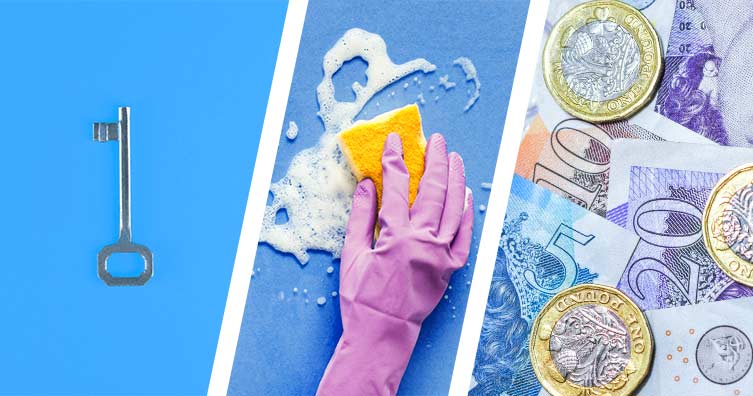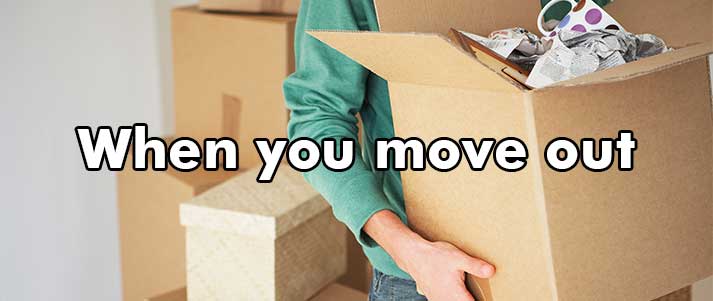How to get your full tenancy deposit back
Ready to pack up your stuff and leave your student house? We have all the info you need to take your full tenancy deposit with you.

Credit: DZeta, Prostock-studio, Ubermensch Matt – Shutterstock
As anyone who's ever rented a property will know, paying a hefty housing deposit when you move into a new place is never fun. But what's even worse is not getting it all back when you move out.
In our National Student Accommodation Survey, the average rental deposit among surveyed students was £263. It's a lot of money but, worryingly, 17% of those who have had a deposit said they've struggled to get this money back at the end of their tenancies.
With this in mind, we've put together our top tips to help you get your full deposit back. Sadly, it will involve you having to put in a bit of time and effort and it's not always guaranteed. But it is possible, so it's worth doing everything you can to get the money returned.
How to get your full deposit back
Tips on getting your deposit back
Follow these steps to increase your chances of getting your deposit back at the end of your tenancy:

Credit: Africa Studio – Shutterstock
-
Take pictures of everything in the house
Taking photos before you leave is an essential part of the moving house checklist. It ensures you've got a visual record of how you left your house. But, you also need to take pictures when you move in too.
If the landlord claims that a big stain on the living room carpet was caused by you and your flatmates, but you know it was already there when you moved in, you'll have the photographic evidence to prove it.
The same applies to damp, cracks and all other student accommodation woes.
If you're lucky, your landlord or estate agent may choose to employ a third-party inventory company to record the condition of the house and its contents when you move in and out (more on this in the next point).
These companies are entirely impartial, so it's less likely you'll need to rely on your photos when you move out.
Generally, though, it's best to take your own photos on the day you move in and send them to the landlord to confirm that they're happy with them to act as a record of the house's condition.
-
Ask for an inventory
Your landlord should hold a checklist of everything that's already in the property when you move in. This is called an 'inventory'. It's used to make sure that no tenant steals any items or furniture that don't belong to them.
Not all landlords will offer tenants a copy of the inventory when they move in. But if they don't, ask for one. The inventory is arguably the biggest factor in getting your deposit back because it's an official record of the state and contents of the property before you lived there.
Look closely at the inventory when you move in. Make sure all tenants are aware of what belongs to the landlord and take extra care of those items so there's nothing to complain about after you've moved out.
Again, your landlord or estate agent may employ a third-party inventory company to compile the inventory when you're moving in and out.
While these people are impartial, you can challenge the inventory if you think a mistake has been made. Watch out for terms like "fair wear and tear" because they are subject to interpretation.
-
Carefully check the tenancy agreement
Your tenancy agreement might sound like something you're always told to read but never actually do (like any terms and conditions section ever). However, you do need to read it – no matter how dull it is.
The terms of a contract differ from one landlord or estate agency to the next. The last thing you want is to get stung on something that can be avoided by simply reading the contract before you sign it.
Read this list of important things to check in your tenancy agreement. You can even see if your university or students' union offer a free contract checking service to help you out.
Some contracts might state, for example, that you need to give two months' notice before you move out. Sometimes, landlords may also let you decorate your room. But, again, you must check the tenancy agreement before cracking on.
It's worth knowing these terms before you sign your tenancy contract, in case you need to negotiate any of the terms before moving in.
-
Make sure your deposit is legally protected
Since April 2007, all private landlords have been legally obliged to pass your deposit onto a government-licensed organisation. This ensures that the money you pay as a deposit remains a deposit. That way, landlords can't unfairly withhold your deposit when you move out.
If your landlord fails to put your deposit into a protected deposit scheme within 30 days of receiving it from you, you could be due compensation.
When you're signing the contracts for the house, you must ask your landlord or estate agent for proof that your deposit is safely protected by one of the government's deposit schemes. You can find out more on the government's website.
If you want to be extra sure, you can even send them a letter requesting official proof.
You can also check whether your landlord has submitted your deposit or not by contacting the deposit scheme sites directly, armed with your postcode, tenancy start date and deposit amount. Use the links below to find the deposit protection schemes in your part of the UK.
Deposit protection schemes
- England and Wales – mydeposits, Deposit Protection Service and Tenancy Deposit Scheme
- Northern Ireland – mydeposits NI, and TDS Northern Ireland
- Scotland – mydeposits Scotland, Letting Protection Service Scotland and Safe Deposits Scotland.
There are some instances when your deposit does not necessarily need to be stored in a deposit protection scheme, including if you are a student in university halls. Find out more on Citizens Advice's website.
Credit: Halfpoint – Shutterstock
-
Consider replacing anything you break
Accidents happen. And let's face it, who can get through an entire academic year without dropping a plate or destroying a shower curtain? That said, all these things cost money.
If you don't do anything about the broken items, the landlord will likely deduct money from your deposit to replace or fix them.
Instead, for small things that are lost or broken, it could be worth looking for cheap replacements before moving out.
But remember that if you (and your housemates) aren't responsible for the damage, it's the landlord's job to fix it.
Equally, if it's something you can't replace yourself (be it too expensive or too big a job, for example), flag it with your landlord as soon as possible. Don't leave it until the day you move out.
-
Make sure you pay off all of your bills
Paying off all your bills in full is important for a few reasons.
First off, it should help you avoid being overcharged by bill companies. When you move out, you need to get in touch with the providers to let them know when your tenancy officially ends. Remember, you're responsible for paying the bills until then, even if you move out beforehand.
Secondly, paying off your bills in full can contribute to you getting your deposit back. If, for any reason, bills that you've left unpaid result in the landlord having to spend money, they can make deductions from your deposit to cover this.
So ask for proof of payment when you pay your final bill.
Lastly, keeping on top of your bills will also ensure your credit rating isn't negatively affected.
If you're struggling to keep up with the cost of bills during your tenancy, consider switching to cheaper gas and electricity providers and have a look at the best broadband deals.
-
Invite your landlord over
Is there due to be an inspection on the day you leave? Add it to your moving house to-do list to invite the landlord over a week or so beforehand to check if there's anything they're not happy with. This way you can address it in advance and ensure you get your full deposit back.
A lot of landlords will appreciate you making the effort to leave their property in good condition, and would rather this than resort to charging you.
If they agree that the house looks good on the day, then you have a good chance of getting all of your deposit back.
Having them over in advance will also allow you to explain in person if they pick out any issues that you believe were already there when your tenancy started. Make sure you have the pictures that were taken when you moved in!

Credit: sirtravelalot – Shutterstock
-
Coordinate moving dates
If you're living in a shared house, it's a good idea to coordinate your moving-out dates with your flatmates. There will likely only be one check-out inspection and you'll all face fines if something isn't up to scratch.
Leaving en masse means you'll be able to split the workload fairly between you. Plus, you can make sure you're all happy with the standard you're leaving the property in. There's nothing more annoying than one tenant bunking off early and leaving all the cleaning to everyone else.
You can also then attend any checkout inspections together. This way, you'll all get the chance to air your views on any problems that arise.
-
Clean the house thoroughly
Cleaning the house before you leave might sound like common sense, but it's often easy to overlook it because you've become accustomed to the way the house is.
To get your full deposit back, the property needs to be in the same condition that it was when you first moved in (apart from fair wear and tear).
As the end of the uni year approaches, it's best to start your cleaning early to minimise the work required on moving day. Make sure everything is just how it was when you moved in.
And it doesn't have to be expensive. Check out our guide to cheap homemade cleaning products for more information. For less than a fiver, you could get everything you need to have the place sparkling again.
Or, if you'd prefer to buy cleaning products instead of making them, you could try these great eco-friendly options.
-
Lock up the house
This is something you should already be doing to keep your house safe from burglars. But, when you leave for the final time, double, triple and quadruple-check that everything is locked up and secure.
If the property is usually a student house, it may sit vacant over the summer months. And it would be a nightmare to find that the property was damaged after you left because you didn't lock up properly.
Student houses also tend to come with multiple sets of key sets, so everyone needs to be responsible for returning their own. Some agencies charge hefty fees if you fail to return them all.
-
Check the state of the house again
When you feel that the house is clean and that the furniture is all in one piece, get together with your flatmates and check everything thoroughly.
The more of you there are to look around the property, the higher the chances that you'll spot something your landlord might pick up on.
If you have a checklist or inventory from the start of the year, go through it together step-by-step so that you're confident you haven't missed anything. It might take a bit of time, but it's worth it if it means getting your deposit back.
-
Throw out any rubbish
Clear out all rubbish from the house before you leave.
This includes throwing out leftover food from the fridge and clearing out your frozen food. If you think your landlord might fancy the last of your fish fingers, you're wrong.
On top of this, if your flat has a prepaid electricity meter, the power will probably cut out once you've vacated the property and stopped topping it up. This means that any food in the fridge or freezer will rot...
You should also use your weekly rubbish and recycling collections as an opportunity to get rid of anything you're not taking with you. Landlords or estate agents are likely to charge you for anything they end up having to dispose of themselves. This will result in not getting your full deposit back.
Don't worry if you've missed the bin-collection day for your street. Local authorities always have a recycling and refuse centre where you can go to throw away your unwanted stuff.
If you have any belongings that you no longer need, you could potentially sell them online or donate them to a charity shop. -
Know your rights as a tenant
Most importantly of all, learn about your rights as a tenant so you can challenge anything which is against the law.
Once you move out, you should receive a letter or email declaring any proposed deductions from your deposit (if any) and the reasons for each one.
What can your landlord deduct from your deposit?
Legally, landlords are allowed to make deductions from your deposit to cover reasonable expenses, including:
- Any unpaid rent
- Cleaning or gardening costs, if the condition isn't similar to what it was when you moved in
- Repairing any damage beyond normal wear and tear*
- Replacing items from the inventory that are now missing*
- Reverting any changes made to the property without the landlord's permission (e.g. redecorating).
* In both cases, the landlord cannot charge you to replace/repair an item to a higher specification than before (e.g. replacing a £10 kettle with a £200 one).
Crucially, landlords must discuss an issue with you first before making a deduction. In these cases, whichever organisation is holding your deposit will keep your money until all disputes are settled.
A decision will be made based on the information and evidence submitted by both the tenant and the landlord. The decision of the tenancy deposit company is final, and they'll also be responsible for deciding how much money will be deducted from the deposit.
Tom Allingham, Communications Director at Save the Student, said:

It really is worth challenging any proposed deductions from your deposit, even if the check was carried out by an independent third party.
When I moved out of an old flat, the check-out report stated that there was no longer a bin in the bathroom. As there was one when we moved in, they were asking us to pay to replace it.
I immediately contacted the agent and pointed out that the bin was still there, and was visible in the corner of one of the pictures included in the report.
The agent then corrected the report and we got our deposit back in full.
How long does your landlord have to return your deposit?
Usually, your deposit should be returned within 10 days of your tenancy agreement expiring. However, if there are any disputes regarding deductions from the deposit, this process may take a little longer.
Either way, as long as your deposit is in a protection scheme, you can be relatively confident of getting it back before too long, and with only reasonable deductions taken off.
If your landlord or estate agent has failed to store your deposit in a protection scheme when they should have, report them. You could be due some compensation.
Check out what is possibly the most disgusting student house ever. It's difficult to see how the tenants could have made it any worse and lost their deposit.








